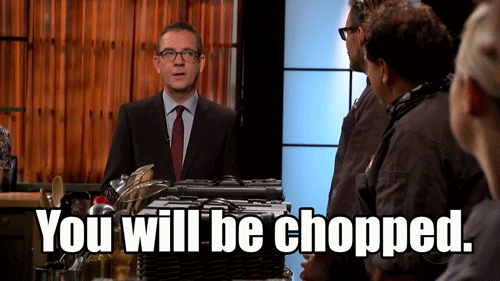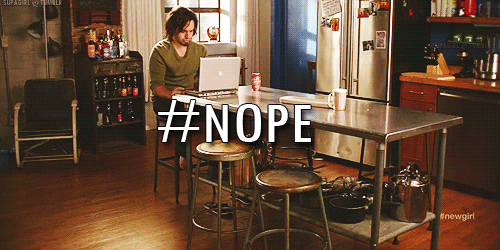![How to Survive A Work[C]hop](https://blogs.colum.edu/marginalia/files/2016/03/200_s.gif)
How to Survive A Work[C]hop
Last semester, I wrote a blog on how I workshop my classmates’ manuscripts. But, what do you do when your own piece is on the chopping block?

Note: I am being dramatic. Please see first point below.
Well, first it’s important to know that I’m kidding. You should NEVER view Workshop as an episode of Chopped! Or any other elimination show. Remember,
- The Creative Writing MFA experience is not a competition.
- You were chosen for a reason.
- No one is looking for a reason to cut you from the program.
That being said, you should also feel confident about what you’ve given to workshop. It doesn’t have to be perfect but, to get the best out of the Workshop experience, you should only submit something you’ve put a real effort into creating. I do not recommend submitting a piece you only began hacking away at the day night a couple hours before. You are a writer. You know BS writing when you see it and so will your peers and your professor. So bring your A-game, not for others but for yourself.
Now, when you get to the actual day of your Workshop, remember to be open and receptive to feedback. Being open does not mean you have to incorporate every single comment into your work. (Seriously, DO NOT DO THIS! YOUR PIECE WILL NOT MAKE SENSE!) Being open just means considering it, weighing what is said against your own inner writing compass. If something said points to your North, then by all means follow it. But if you hear something that sends your compass needle into a spiral, do not allow yourself to be lost. Remember you will never please every reader. I’d even argue that you shouldn’t even TRY to please every reader. So stay true to you while also seeing if others can help you see your stuff better.
In connection with being open, participate. Different professors have different rules and ways of handling Workshop. I had one professor my first year who required me make all of the changes he suggested—but only for the purposes of the class. The point was to make the weighing and considering process literal. We could then physically see and engage with the suggestions before tossing them aside. He didn’t expect to keep all of the changes—in fact, he also required we keep another, more “us” version saved also.
That is just one example. Some professors let the writer talk; others ask that the writer remain silent during the session. Different methods attempt to do the same thing—give the author the feedback s/he needs to make the piece, and ultimately the writer, as strong as possible. You are not expected to remain the same writer you were when you entered the program.

If you leave the program thinking you’re the same writer you were going in, maybe you should just go ahead and do this.
You should also bring your own copy of the manuscript to class. Take notes in any way that makes sense to you, but bring your own copy to quickly reference passages that are discussed.
When taking notes, be sure to make note of all the positive feedback. (You think this is a no-brainer, but sometimes it’s easy for the writer to overlook the good to focus on the “bad”). Highlight strong passages, pay attention to any reactions your Workshoppers offer. Keep a record of all the ways you’re awesome. That way, when you go back to tackle whatever in the piece is blocking the story, you can have your strengths readily at your side to assist. Also, push modesty to the curb.
Like I said earlier, you were chosen for a reason. You’re awesome!! Notice and really hear all the ways you rock so you can recall them later when you aren’t feeling like quite as bright a star. And if you have questions, don’t be afraid to ask. If the Workshop doesn’t allow you to speak during the session, follow up with your classmate(s) and/or professor afterward, whether immediately following class or via email. It’s your work. You ultimately want to leave the session with some sense of how to proceed with the piece. If not, don’t be afraid to follow up until you do.
Once you’re home from the session though, celebrate. Have a mini jam session. Open a bottle of wine. Unwind. You’ve made, it you’ve survived. You’ve lived to write another day.

#BasicallyMeAfterWorkshop
Speaking of writing another day, you know what you do the next day? You keep writing. You can choose what works best for you, diving immediately back into a piece or setting it aside awhile to view with fresher eyes. But write, write, write, write. Submit for the next Workshop. And then repeat.
